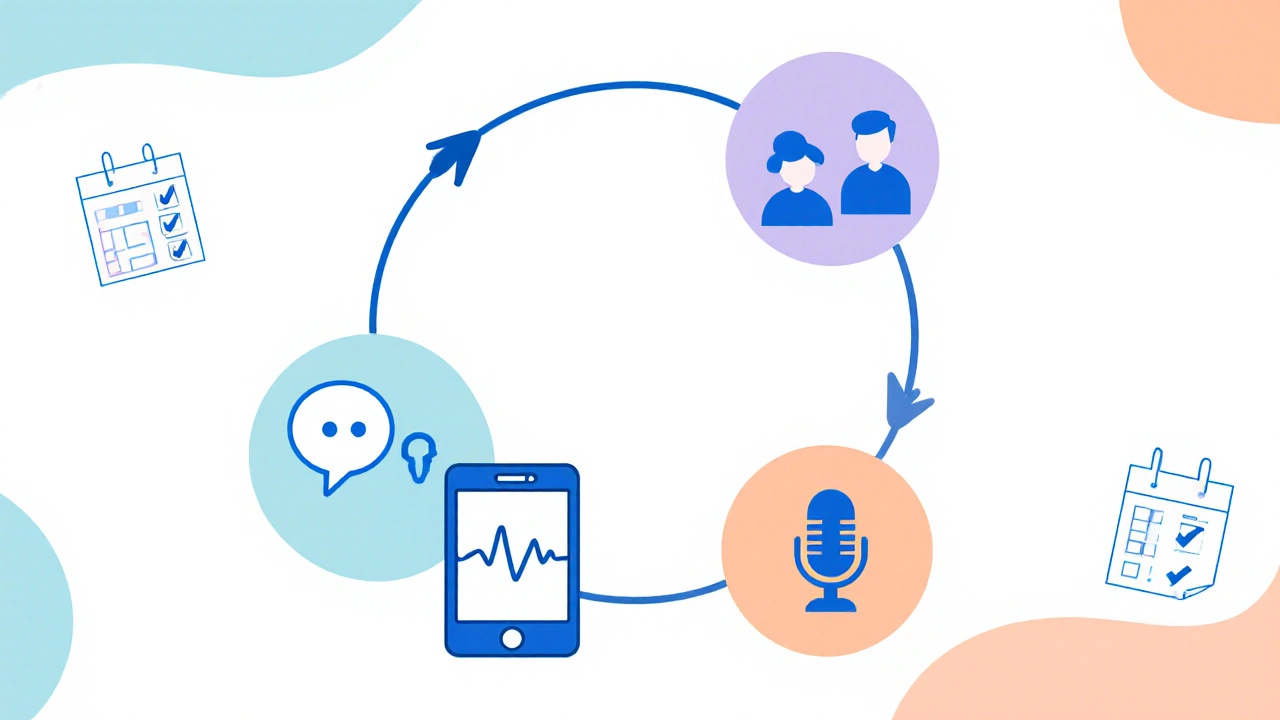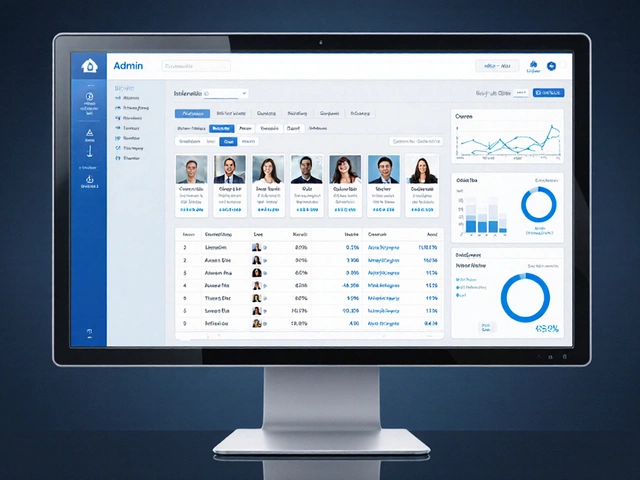English Speaking Platform Finder
Find Your Perfect English Speaking Platform
Answer a few questions to get personalized recommendations for the best platform to improve your speaking skills.
Recommended Platforms
Ever wonder why some people sound fluent after just a few weeks of practice while you’re still stuck on "how do you say ___?" The missing piece is usually the right English speaking website. Below you’ll find a complete, no‑fluff guide that helps you pick a platform, avoid common traps, and actually start sounding natural on video calls.
What Makes a Good English Speaking Website?
Before diving into the list, it’s worth knowing what to look for. A solid platform should give you:
- Live interaction: Real‑time conversation with native speakers or trained tutors.
- Instant feedback: Either AI‑driven pronunciation scores or human corrections.
- Flexible scheduling: Ability to practice whenever you have a 15‑minute window.
- Progress tracking: Clear metrics so you can see improvement over weeks.
- Engaging content: Role‑plays, debates, and real‑world scenarios, not just textbook dialogs.
When a site nails at least three of these, you’re likely in good hands.
Top Free & Paid Platforms for Speaking Practice
Below is a rounded‑up list of the most popular options as of October 2025. Each entry gets a quick intro, pricing snapshot, and the key strengths you’ll care about.
iTalki is a marketplace that connects language learners with qualified native‑speaker tutors for one‑on‑one video lessons. You can book a 30‑minute session for as little as $8, and the platform lets you filter tutors by accent, teaching style, and hourly rate. The biggest win? Real‑time correction and a flexible cancellation policy.
Cambly is an on‑demand video‑chat service that pairs you with native‑speaking tutors instantly. No scheduling needed-just log in and you’re speaking. Prices start at $10.99 per hour, and the interface is ultra‑simple, making it perfect for busy professionals who need a quick speaking burst.
Preply is a platform that offers a blend of professional teachers and community tutors for personalized English lessons. Hourly rates range from $5 to $30, depending on the tutor’s qualifications. Preply’s standout feature is the “Lesson Planner,” which lets you set goals (e.g., "business English" or "travel") and get a custom curriculum.
Speakly is an AI‑driven app that focuses on speaking fluency through real‑life situations and instant pronunciation scoring. The free tier gives you 5 minutes of daily practice; the premium plan (about $12/month) unlocks unlimited conversation drills and detailed analytics.
ELSA Speak is an AI pronunciation coach that records you, analyzes the sound, and suggests micro‑adjustments. While it’s not a live‑tutor service, it shines for solo practice. The free version offers two daily lessons; the premium subscription ($8.99/month) adds unlimited feedback and a library of business‑level dialogues.
Rosetta Stone is a long‑standing language suite that combines immersive lessons with a speech‑recognition engine. The “Live Tutoring” add‑on (extra $49/month) pairs you with a certified coach for 30‑minute sessions. Even the core product is strong for beginners who want a structured path before jumping into live conversation.
BBC Learning English is a free resource that offers podcasts, video series, and pronunciation exercises all curated by BBC journalists. It’s not a tutoring platform, but the “English at Work” series includes real‑world interview simulations that you can mimic and record for self‑assessment.
Duolingo English Test - Speaking Module is a short, AI‑graded oral exam that gives you instant feedback on pronunciation, fluency, and relevance. The test costs $59 and doubles as a certification for university applications, giving you a practical high‑stakes speaking challenge.
Google Meet Practice Groups is a community‑driven set of video‑chat rooms where learners rotate speaking topics every 10 minutes. It’s completely free; you just need a Google account. The vibe is informal, making it great for low‑pressure conversation practice.
Tandem is a language‑exchange app that matches you with native speakers who want to learn your mother tongue. The free version lets you send unlimited text and voice messages; the premium tier ($6.99/month) unlocks video calls and translation‑free chatting.
How to Choose the Right Platform for Your Goals
Not every site suits every learner. Ask yourself these three questions before you click “Subscribe”.
- What’s your primary objective? If you need a formal business accent, iTalki’s business‑focused tutors are a win. If you simply want to boost confidence for travel, Tandem’s casual exchanges work better.
- How much time can you commit weekly? Busy schedules benefit from on‑demand services like Cambly. If you can set a regular slot, Preply’s structured lesson plans keep you accountable.
- What’s your budget? The free tier of Speakly + BBC Learning English can get you to B1 level. Once you hit B2, consider a paid tutor for nuanced feedback.
Map your answers onto the comparison table below, and you’ll see the best fit instantly.
Practical Tips to Get the Most Out of Online Speaking Practice
- Record and replay: Even if the platform doesn’t auto‑record, use a phone app to capture your voice. Listening back reveals hidden mistakes.
- Use a script, then go off‑script: Start each session with a prepared dialogue, then challenge yourself to improvise for the last 5 minutes.
- Set micro‑goals: Instead of “be fluent”, aim for “use three new phrasal verbs in a conversation”. Measurable goals keep motivation high.
- Shadow native speakers: After watching a TED‑Ed talk, pause and repeat sentences exactly as you hear them. This trains rhythm and intonation.
- Ask for correction codes: On iTalki or Preply, request that the tutor writes down any repeated errors in a shared Google Doc for review later.
Common Pitfalls and How to Avoid Them
Even the best platform won’t fix a bad habit if you fall into these traps:
- Choosing the cheapest tutor and assuming price equals quality. Look at student reviews and ask for a trial lesson first.
- Only practicing with the same partner. Switch accents and speaking styles to broaden your ear.
- Speaking in a vacuum. Pair your sessions with listening activities (podcasts, movies) to reinforce vocabulary.
- Neglecting pronunciation drills. Use ELSA Speak or the speech‑recognition feature in Rosetta Stone for focused mouth‑muscle training.

Quick Comparison Table
| Platform | Price (Typical) | Live Tutor | AI Feedback | Mobile App | Free Tier |
|---|---|---|---|---|---|
| iTalki | $8‑$30 per hour | Yes (tutor‑led) | Limited (text corrections) | iOS & Android | No |
| Cambly | $10.99 per hour | Yes (instant) | None | iOS & Android | No |
| Preply | $5‑$30 per hour | Yes (tutor‑led) | Basic (auto‑transcript) | iOS & Android | No |
| Speakly | Free / $12 /mo premium | No (AI‑driven) | Extensive (pronunciation score) | iOS & Android | Yes (5‑min daily) |
| ELSA Speak | Free / $8.99 /mo premium | No | High‑precision (phoneme analysis) | iOS & Android | Yes (2 lessons) |
| Rosetta Stone | $11‑$49 /mo (add‑on) | Optional (Live Coaching) | Moderate (speech‑recognition) | iOS & Android | No |
| BBC Learning English | Free | No | None (self‑study) | iOS & Android | Yes |
| Duolingo English Test | $59 (one‑time) | No | AI‑graded speaking module | iOS & Android | No |
| Google Meet Groups | Free | Group practice (no tutor) | None | Web & Mobile | Yes |
| Tandem | Free / $6.99 /mo premium | Community (language exchange) | None | iOS & Android | Yes |
Next Steps: Build Your Speaking Routine in 30 Days
Pick one platform from the table, schedule a 15‑minute slot every weekday, and follow the three‑step loop:
- Warm‑up: Use a pronunciation app (ELSA or Speakly) for 3 minutes.
- Live conversation: Jump on a tutor session or language‑exchange call for 10 minutes.
- Review: Record the call, note three errors, and practice those sounds daily.
After a month, you’ll notice smoother intonation and fewer “uh‑uh‑uh” pauses. Keep the loop going, and you’ll keep climbing the fluency ladder.
Can I improve speaking without spending money?
Yes. Combine free resources like BBC Learning English, Google Meet practice groups, and the free tier of Speakly. Focus on daily short sessions and use a free recorder app to self‑review.
Is hiring a native tutor worth the cost?
If you need fast, targeted feedback-especially for business English or exam preparation-a native tutor can cut months off your learning curve. Look for trial lessons first to gauge fit.
How often should I practice speaking?
Consistency beats marathon sessions. Aim for 15‑20 minutes a day, five days a week. Short, focused practice builds muscle memory better than occasional hour‑long marathons.
What’s the best way to track progress?
Use a simple spreadsheet: column for date, platform, duration, and three self‑identified errors. Review it weekly to spot patterns and celebrate wins.
Do AI‑only apps replace human tutors?
AI tools are great for pronunciation drills and instant scoring, but they can’t mimic natural conversation flow, cultural nuance, or real‑time correction of grammar. Use AI as a supplement, not a replacement.





Write a comment